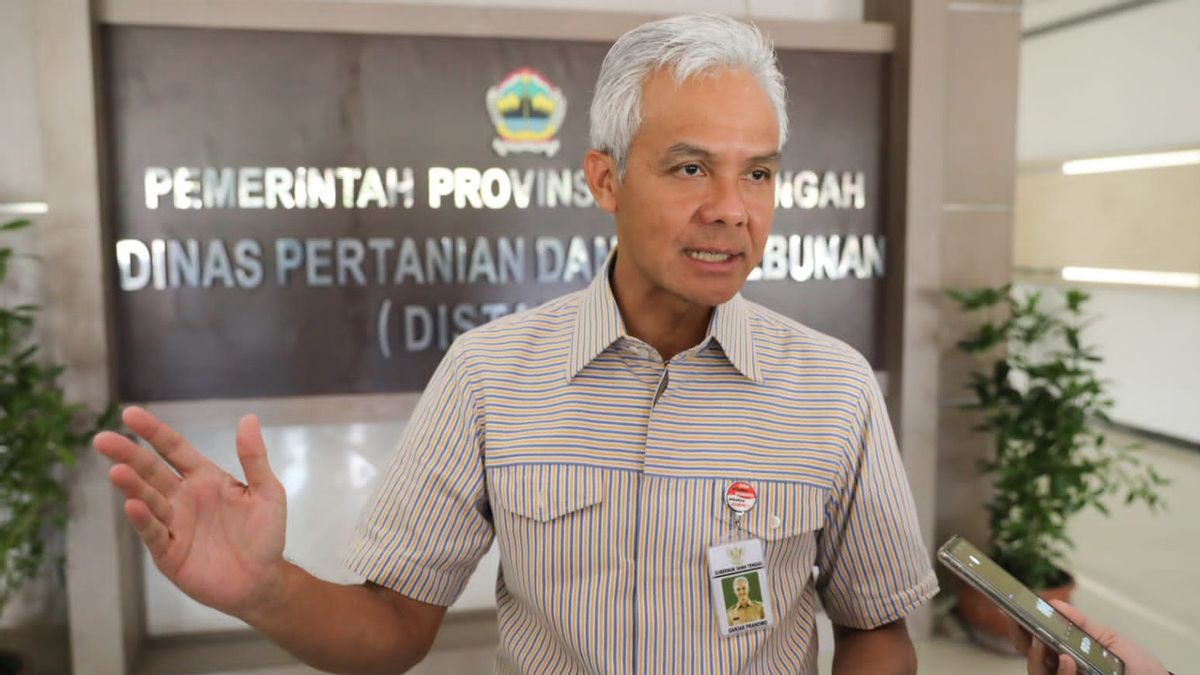Central Java Governor Ganjar Pranowo has prepared a strategy by regulating planting patterns to control the supply and availability of food commodity stocks. Especially related to inflation-causing commodities such as rice.
This was conveyed by Ganjar after the Coordination Meeting for the Evaluation of Food Crops and Horticulture Products at the Office of the Agriculture and Plantation Office of Central Java Province, Ungaran, Semarang Regency, Tuesday, February 14. "The first problem we managed to identify was that the harvest area was not evenly distributed," said Ganjar.
Present at the meeting were the Head of the BI Representative Office in Central Java, Rahmat Dwisaputra, the Head of the Distanbun Supriyanto and the Head of the Food Security Service, Diyah Lukisari. In addition, there were also representatives of Bulog and related BUMD.
The governor of Central Java for two periods prepared a strategy by regulating the planting pattern. According to Ganjar, this method can make it easier for the government to map the area of land, how many farmers are, until the planting and harvesting period.
"So we can predict, later if a bad situation occurs, then we can manage it well, and I ask for this to be digitized. The farmer card can actually record the number of farmers and how much area it is, and we actually need to process it," he said.
Meanwhile, the distribution of productivity is also not evenly distributed in urban districts. Ganjar said, rice productivity in Central Java is an average of 56.37 kw/ha or about 5.6 tons per hectare.
"This is small, too small. The cause is two, one seed is not good, two fertilizers are lacking," he said.
Distanbun noted that the allocation of subsidized fertilizers consists of urea fertilizers, NPK fertilizers, and NKP (+) in Central Java amounting to 1,165,609 tons. While the need reaches 2,011,477.66 tons. In addition, productivity challenges are also affected by climate change. This factor, said Ganjar, makes the agricultural situation change and plants are attacked by Plant Disruption Organisms (OPT) so as to reduce productivity.
"So what we have to do, in some places we start to encourage to combine with organic fertilizer," he said. The problem of fertilizer is a concern. Ganjar said, not only the region but the central government must also immediately take policies. Among other things, by intervening in buying agricultural products.
"It is impossible for agricultural products specifically for food not to be intervened by the government, it is impossible, the government must go down on this," he said.
Ganjar said this planting pattern strategy would be communicated with farmers. According to him, efforts to overcome the problem of scarcity of rice also need support from farmers.
"We are trying to communicate the planting pattern, we will communicate this with farmers, so that we want and downstream rice traders we also invite communication so that we can protect it together because our first harvest is also absorbed into other provinces," he said. In addition to planting patterns, Ganjar will also encourage the development of superior seeds, by cooperating with existing research institutions such as BRIN. Ganjar believes that Indonesia is able to realize food independence with superior seeds.
"There are many research institutions in the ministry of agriculture quite a lot, there is BRIN like that. Let's make superior seeds. Indonesia for food crops must have its own superior seeds. If that can happen then it will be done," he said.
The English, Chinese, Japanese, Arabic, and French versions are automatically generated by the AI. So there may still be inaccuracies in translating, please always see Indonesian as our main language. (system supported by DigitalSiber.id)













